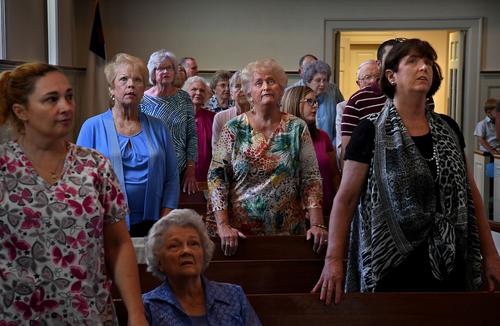The Biblical Roots of Fox News
Dominion Voting Systems recently filed a motion in their court case against Fox News. They present clear and convincing evidence that Fox News deliberately lied to its viewers about Dominion and about the 2020 election. Dominion explains:
why did Fox peddle this false narrative to its viewers? Fox’s correct call of Arizona for Joe Biden triggered a backlash among its audience and the network [was] being rejected. Rival networks such as Newsmax took advantage of the opening by promoting an “alternative universe” of election fraud. So Fox went on war footing, caring more about protecting its own falling viewership than about the truth.
This isn’t just Dominion’s one-sided opinion in a lawsuit. Dominion subpoenaed emails and text messages from Fox employees, broadcasters, executives, and board members. They also questioned those people, under oath. Their court filing is filed with direct quotes from Fox News itself, proving that Fox News was deliberately lying.
At this point, there is absolutely no reason to treat Fox News as a credible “news” source. They have lied to their viewers. They continue to lie to their viewers. They’re desperate to keep their viewers happy and will say anything that they need to say to do that. There is absolutely no way to know which stories might be true and which stories are complete fabrications. You have to treat the entirety of Fox News—the TV broadcasts and the website both—as something that will regularly, maliciously mislead you.
Why? It’s what the people want. The people who watch, listen to, and read Fox News are the very personification of 2 Timothy 4:3–4.
For the time is coming when people will not put up with sound teaching, but, having their ears tickled, they will accumulate for themselves teachers to suit their own desires and will turn away from listening to the truth and wander away to myths.
Everyone at Fox News illustrates a Biblical truth themselves. When the pressure was on and they had an opportunity to report the truth, they chose to cater to what their audience most wanted to hear. They put profits above facts, proving again that, “the love of money is a root of all kinds of evil, and in their eagerness to be rich some have wandered away from the faith and pierced themselves with many pains”.
But you don’t have to take my word for it. Read the legal filing for yourself. Here is just a tiny sampling of what you’ll find inside.
Fox’s viewers were angry and Fox’s hosts knew it.
viewers were livid. Within an hour of Fox calling Arizona, in early morning on November 4, Suzanne Scott forwarded Jay Wallace an email from Fox Corporation Executive Raj Shah noting “Lots of conservative criticism of the AZ call”. Fox’s senior executives discussed the heavy backlash from the Arizona call at their daily editorial meeting that morning. On November 5, Fox’s Chief White House Correspondent told Sammon and FNC President Jay Wallace, “we are taking major heat over the AZ call Our viewers are also chanting Fox News sucks, something I have never heard before.” There were internal Fox emails stating “Holy cow, our audience is mad at the network”, and “They’re FURIOUS”.
The backlash was so strong that Fox Hosts Tucker Carlson, Laura Ingraham, and Sean Hannity immediately understood the threat to them personally. Carlson wrote his producer Alex Pfeiffer on November 5: “We worked really hard to build what we have.Those fuckers are destroying our credibility. It enrages me.” He added that he had spoken with “Laura and [S]ean a minute ago” and they are “highly upset”. Carlson noted: “At this point we’re getting hurt no matter what”. Pfeiffer responded: “It’s a hard needle to thread, but I really think many on our side are being reckless demagogues right now.” Tucker replied: “Of course they are. We’re not going to follow them.” And he added: “What [Trump]’s good at is destroying things. He’s the undisputed world champion of that. He could easily destroy us if we play it wrong.”
Fox’s hosts started to tell their audiences what they wanted to hear.
Hannity faced a similar dilemma. On November 5, Hannity told his audience that “it will be impossible to ever know the true, fair, accurate election results, that’s a fact”. Producer Robert Samuel told the team: “My two cents gotta be super careful on any allegations since people can say you’re pushing that American democratic system can’t be trusted. Just have to be 1000 percent sure and very careful”.
And telling the truth became a risky activity at Fox.
Fox executives also began to criticize Fox hosts for truthful reporting. On November 9, Fox anchor Neil Cavuto cut away from a White House Press Conference when Press Secretary Kayleigh McEnany began making unsubstantiated allegations about election fraud. As Cavuto told viewers, “Whoa, whoa, whoa She’s charging the other side as welcoming fraud and illegal voting, unless she has more details to back that up, I can’t in good countenance continue to show you this and that’s an explosive charge to make.” The brand team led by Raj Shah at Fox Corporation notified senior Fox News and Fox Corporation leadership of the Brand Threat posed by Cavuto’s action.
What brand threat? The threat that angry viewers would stop watching Neil Cavuto and Fox News and start watching Newsmax instead.
Fox Executives also observed with concern the rise of Newsmax, a far-right network attempting to capitalize on viewer dissatisfaction with Fox. Prior to November 8, Fox Executive David Clark testified that Newsmax was not a credible media outlet because “their hosts were extremely one sided, ignored the facts, they did not seem to care about telling the truth, they seemed to invest truly in conspiracy theories versus fact.” On November 10, Scott pointed senior Fox executives to a note from analyst Kyle Goodwin on Newsmax’s rise. Fox Executive Porter Berry responded: “Just pulled up [Newsmax’s] show and they’re hitting Cavuto. They are just whacking us. Smart on their part.” Lauren Petterson added: “They definitely have a strategy across all shows to try to target and steal our viewers.” Scott told Goodwin: “Keep an eye and continue to report on Newsmax.”
Also on November 10, Scott and Wallace texted about the numbers they had just received. Wallace: “The Newsmax surge is a bit troubling truly is an alternative universe when you watch, but it can’t be ignored”. Scott: “Yes.” Wallace: “Trying to get every one to comprehend we are on a war footing”.
Fox hosts tried to get reporters fired for reporting the truth and ensured that truthful reporting was deleted.
Meanwhile, later that night of November 12, Ingraham was still texting with Hannity and Carlson. In their group text thread, Carlson pointed Hannity to a tweet by Fox reporter Jacqui Heinrich. Heinrich was “fact checking” a tweet by Trump that mentioned Dominion—and specifically mentioned Hannity’s and Dobbs’ broadcasts that evening discussing Dominion. Heinrich correctly fact-checked the tweet, pointing out that “top election infrastructure officials” said that “There is no evidence that any voting system deleted or lost votes, changed votes, or was in any way compromised.”
Carlson told Hannity: “Please get her fired. Seriously What the fuck? I’m actually shocked It needs to stop immediately, like tonight. It’s measurably hurting the company. The stock price is down. Not a joke.” Tucker added: “I just went crazy on Meade over it.” Hannity said he had “already sent to Suzanne with a really?” He then added: “I’m 3 strikes. Wallace shit debate Election night a disaster[.] Now this BS? Nope. Not gonna fly. Did I mention Cavuto?”
Hannity indeed had discussed with Scott. Hannity texted his team: “I just dropped a bomb.” Suzanne Scott received the message. She told Jay Wallace and Fox News’ SVP for Corporate Communications Irena Briganti: “Sean texted me—he’s standing down on responding but not happy about this and doesn’t understand how this is allowed to happen from anyone in news. She [Heinrich] has serious nerve doing this and if this gets picked up, viewers are going to be further disgusted.” By the next morning, Heinrich had deleted her fact-checking tweet.
This entry was tagged. Bible Corruption Fact Check Greed Morality News President2020 Republicans Sin
Discuss this post with me, on Mastodon.

